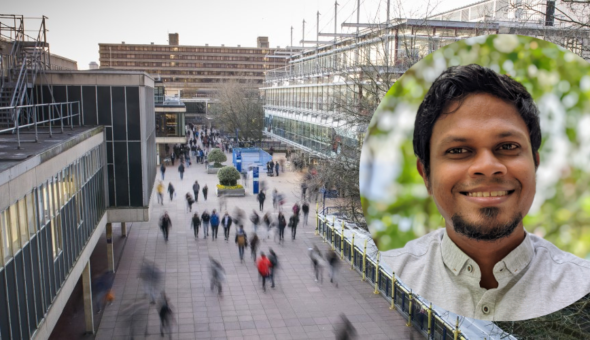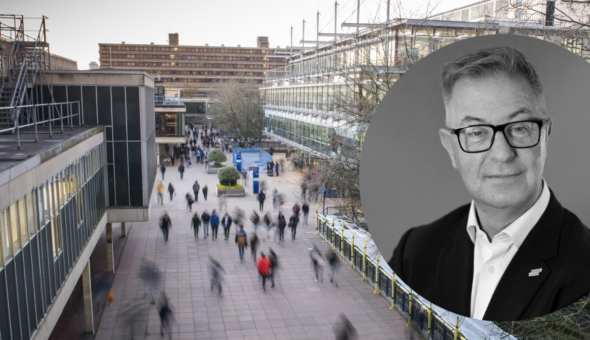Matthew is Global Head of Multi Asset Investment Management for Fidelity International, responsible for $50 billion in stocks, bonds and other investments worldwide.
He leads a team of investors based in Hong Kong (where he lives and works), Singapore, Tokyo, Shanghai, Taipai, London and Milan, and manages Absolute Return and institutional investments on behalf of governments in Asia.
Here, Matthew tells us how his Mathematical Sciences degree and industrial placement set him for success in a job that he loves, and shares his advice for making the most of what Bath has to offer.
Why did you choose to come to Bath?
I loved sports and maths, and Bath has fantastic sports facilities and was ranked as the best university for mathematics at the time. I also knew the city to be beautiful and had watched rugby there before. It fitted my personality.
I came from a state school and a small village and felt at home at Bath when I visited on an Open Day.
Did you have a particular career in mind when you chose your course?
When I was five years old, I said to my friend’s parents as they were driving me home from tennis practice, that I wanted to be an actuary, because they were ‘super accountants’. The truth is that was all I knew, as I’d heard that from a family friend I’d met once.
I didn’t know many industries and certainly didn’t know about ‘asset management’ or ‘multi-asset investing’. It was a steep learning curve and a lot of research during university that finally pushed me in this direction.
Can you tell us about your experience of studying here? Any favourite memories, or places to go on campus and in the city?
I loved my time at Bath. I joined the first year Solsbury Court opened, and I have strong memories of building friendships there and walking across the car park to the sports centre.
Playing lacrosse gave me life experiences that I probably can’t put into words. I was treasurer for sport in the Students’ Union and that really helped me to mature. It also importantly got me into Score (the Wednesday SU club night) for free, too!
My final year of study was a different pace and my attitude had shifted, having returned from a year in industry. The library was a very sociable place for me that year, and I remember working hard to find a career that would suit me.
Tell us about your career journey since graduating.
I am now Global Head of Multi Asset Investment Management for Fidelity International and I work and live in Hong Kong. I’m responsible for circa. $50 billion invested globally in stocks, bonds and other investments. I manage a team of very talented investors based in Hong Kong, Singapore, Tokyo, Shanghai, Taipai, London and Milan.
I am also a Portfolio Manager, managing Absolute Return and institutional investments on behalf of governments in Asia, and I’m a board member of Fidelity in Hong Kong.
To tell you how I got here, firstly, my year’s placement in industry taught me a lot about the real world and what different industries can give you. I realised there were some things I didn’t want to do because they involved looking backwards and would bore me. Some jobs would limit me to London and others would have me working 100-hour weeks.
I think it’s important to boil a career path down to its parts like; who will you work with and how? Where can you live? Are there limits such as only being based in big cities, or only living in the UK? What skills will you use? Can you work from home or is it office work or travel? Is the company selling you or a product? Are you charging by the hour? Answering these questions about career choices matters.
I love asset management because I get to use maths every day in risk management for portfolios. I use economics in what I think the US economy is doing, I use engineering when I build financial solutions for clients, and every newspaper and most major political events in the world are relevant to my job. I get to debate with lots of very smart people on each subject.
I have a smile on my face as I write this. It’s why I put in hugely long hours in my 20s and why I am sitting here today, because I love what I do. I problem-solve and I’ve developed investing skills that make me credible.
Describe an average day in your role.
No day is the same. I drop the kids at the school bus around 7:30am, I get a coffee and I’m in the office by 8am. The first hour is mainly overnight emails and markets. I read about geopolitics, study quantitative models and think about whether my investment strategy is right.
Usually, during that hour, members of the team will come to my desk, and we’ll have a few minutes to chat about an idea or issue. That is one reason the office (as part of flexible working) is important, as those little chats with juniors are part of their training.
I’m then in meetings a lot; ranging from client meetings and developing new investment processes (we love to innovate!) to oversight meetings. Working in a global firm and sitting in Asia means I often work late but I’m strict with only two nights a week. I travel about once a month for about three to five days, probably going to 12 countries per year or so. I was in Malaysia yesterday meeting a new client.
Asset management is not charged by the hour. In reality, a few big decisions per year and a few more medium decisions drive most of the success and therefore it is about giving time and space for those to be high quality. To get to the point of being able to make those decisions takes a lot of hard work, though.
How do the workplace cultures you have experienced overseas compare to the UK?
Culture in general is a fascinating subject, and I’d suggest reading The Culture Map by Erin Meyer for a great insight. It’s so much wider than where one works – the reality is that culture is different between Taiwan, Malaysia, Singapore, Japan, Italy, the US, South Africa.... In a global business you have to adapt to all of them.
It’s less about where you sit and more about the company you work for and the markets you operate in. Fidelity has a very strong work-life balance and compassionate culture, and arguably many British and US quirks and you feel them in Hong Kong same as London.
If I worked for a Chinese bank, for example, it’d have a very different culture and that would be largely the same if I worked for them in London or Hong Kong. Hours are a bit different in Hong Kong to London but that’s more a function or the globe spinning.
I was very green when I started but now, I have spent a lot of time with clients in different parts of the world and part of the job is learning and adapting to other cultures and gaining trust.
For example, don’t expect disagreement in a meeting in Japan and follow up after the meeting. Best to write before, too, if you can. Where you sit at the table matters a lot in China. We Brits are known to talk in code. I find it fascinating.
How did your studies help you to develop?
Mathematical Sciences gave me a base in maths, coding, physics, economics and business. Coupled with the year in industry, it really set me up well. The broader and practical side to some of the study helped.
I also think time at university helped me to mature socially and exposed me to new ways of thinking more generally. One can’t under estimate that side of what university does.
What advice would you give to prospective students thinking about studying at Bath?
Bath can give you so much, especially if you are like me and enjoy studies, sport and other interests. You are time-rich and probably monetarily poor at university. If successful, you are likely to be quite monetarily rich and time-poor for most of the rest of your life.
Bath offers opportunity and I would just say use the time! I spent too long messing around with friends at university. You have so many clubs, people, lectures, opportunities. Feast on it. My regret when I look back is that Bath offered so much more and I didn’t take advantage of it enough and that I wasn’t a bit more entrepreneurial while at university.
The other point to remember the career market is very tough and has only got tougher. In Hong Kong, we had over 600 applicants for one internship last year. Bath sets you up very well in this respect. Keep thinking how you can be one step ahead of the pack in terms of proactive thinking and developing the soft skills needed in the workplace – Bath is one of the best at getting that side of things right.
Respond



